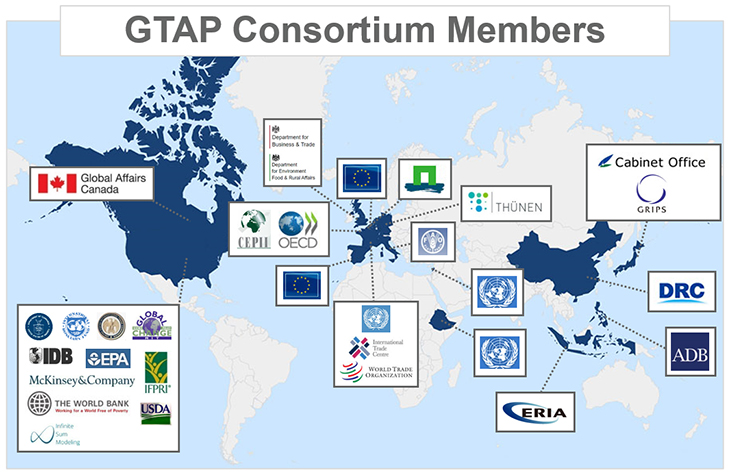About GTAP: GTAP Consortium
Founded in 1992, the Global Trade Analysis Project, a network of researchers and policy-makers analyzing international policy issues, is coordinated by the Center for Global Trade Analysis in the Department of Agricultural Economics at Purdue University. Guidance and base-level support for the project is provided by the GTAP Consortium, which unites members from government agencies, international institutions, the private sector, and academia. Members of the GTAP Consortium are represented on the GTAP Advisory Board which advises the Center on matters of policy, research, and funding. The GTAP Advisory Board currently consists of 30 consortium members and 3 members at large.

GTAP Consortium Members
- Asian Development Bank - Mandaluyong City, Philippines
GTAP Advisory Board Representative: Jong Woo Kang
- Centre d'Etudes Prospectives et d'Information Internationales - Paris, France
GTAP Advisory Board Representative: Antoine Bouët
- CSEP Research Foundation - Chanakyapuri, New Delhi, India
GTAP Advisory Board Representative: Rajesh Chadha
- Department for Business & Trade - London, United Kingdom
GTAP Advisory Board Representative: Michael Williams
- Economic and Social Research Institute, Cabinet Office - Tokyo, Japan
GTAP Advisory Board Representative: Susumu Suzuki
- Economic Research Institute for ASEAN and East Asia - Jakarta Pusat, Indonesia
GTAP Advisory Board Representative: Lurong Chen
- European Commission - DG Trade - Brussels, Belgium
GTAP Advisory Board Representative: Jan Schmitz
- European Commission - Joint Research Centre - Seville, Spain
GTAP Advisory Board Representative: Matthias Weitzel
- Food and Agriculture Organization of the United Nations - Rome, Italy
GTAP Advisory Board Representative: Aikaterini Kavallari
- Global Affairs Canada - Ottawa, Canada
GTAP Advisory Board Representative: Shenjie Chen
- Infinite Sum Modelling - Sammamish, United States
GTAP Advisory Board Representative: Badri Narayanan
- Inter-American Development Bank - Washington DC, United States
GTAP Advisory Board Representative: Paolo Giordano
- International Food Policy Research Institute - Washington DC, United States
GTAP Advisory Board Representative: Fousseini Traore
- International Monetary Fund - Washington, United States
GTAP Advisory Board Representative: Hugo Rojas-Romagosa
- King Abdullah Petroleum Studies and Research Center - Riyadh, Saudi Arabia
GTAP Advisory Board Representative: Olivier Durand-Lasserve
- KPMG International Services Limited - London, United Kingdom
GTAP Advisory Board Representative: Matthew Weston
- McKinsey & Company, Inc. - Atlanta, United States
GTAP Advisory Board Representative: Jeffrey Condon
- MIT Center for Sustainability Science and Strategy - Cambridge, United States
GTAP Advisory Board Representative: Sergey Paltsev
- Organisation for Economic Co-operation and Development - Paris, France
GTAP Advisory Board Representative: Przemyslaw Kowalski
- The World Bank - Washington DC, United States
GTAP Advisory Board Representative: Maryla Maliszewska
- Thünen Institute of Market Analysis - Braunschweig, Germany
GTAP Advisory Board Representative: Janine Pelikan
- U.S. Department of Agriculture, Economic Research Service - Washington DC, United States
GTAP Advisory Board Representative: Utpal Vasavada
- U.S. Department of Commerce - Gaithersburg, United States
GTAP Advisory Board Representative: Chris Rasmussen
- U.S. Environmental Protection Agency - Washington DC, United States
GTAP Advisory Board Representative: Andrew Schreiber
- U.S. International Trade Commission - Washington DC, United States
GTAP Advisory Board Representative: William Powers
- United Nations Development Programme - New York, United States
GTAP Advisory Board Representative: Babatunde Abidoye
- United Nations Economic and Social Commission for Western Asia - Beirut, Lebanon
GTAP Advisory Board Representative: Mohamed Abdelbasset Chemingui
- United Nations Economic Commission for Africa - Addis Ababa, Ethiopia
GTAP Advisory Board Representative: Stephen Karingi
- Wageningen Social and Economic Research - The Hague, The Netherlands
GTAP Advisory Board Representative: Hans van Meijl
- World Trade Organization - Geneva, Switzerland
GTAP Advisory Board Representative: Eddy Bekkers
GTAP Advisory Board Members at Large
If you are interested in joining the GTAP Consortium, please email Holly McIntire hcmcinti@purdue.edu.



